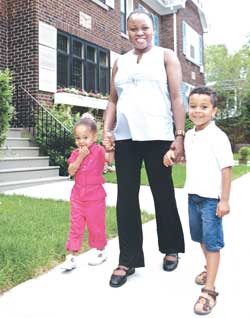×
The Standard e-Paper
Stay Informed, Even Offline
She is jobless, rolls on a state of art high performance SUV, lives in one of Nairobi’s leafy suburbs and has four children attending private international schools.
 |
| An expectant mother with her children.[PHOTOS: MARTIN MUKANGU/STANDARD AND COURTESY] |
Meet a new cadre of women who lazy about by the day, but are seen frequenting high-end shopping malls after children are from school. They assert that they do not engage in fraud scams to finance their luxurious lives. Well, this is a clear indication that the traditional standards of marriage and child bearing in society are changing and evolving.